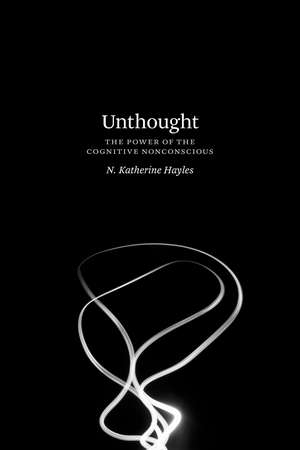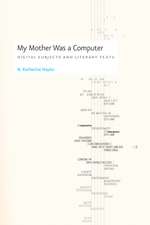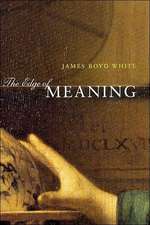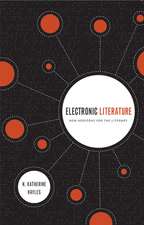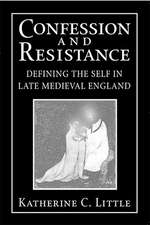Unthought: The Power of the Cognitive Nonconscious
Autor N. Katherine Haylesen Limba Engleză Paperback – 5 apr 2017
N. Katherine Hayles is known for breaking new ground at the intersection of the sciences and the humanities. In Unthought, she once again bridges disciplines by revealing how we think without thinking—how we use cognitive processes that are inaccessible to consciousness yet necessary for it to function.
Marshalling fresh insights from neuroscience, cognitive science, cognitive biology, and literature, Hayles expands our understanding of cognition and demonstrates that it involves more than consciousness alone. Cognition, as Hayles defines it, is applicable not only to nonconscious processes in humans but to all forms of life, including unicellular organisms and plants. Startlingly, she also shows that cognition operates in the sophisticated information-processing abilities of technical systems: when humans and cognitive technical systems interact, they form “cognitive assemblages”—as found in urban traffic control, drones, and the trading algorithms of finance capital, for instance—and these assemblages are transforming life on earth. The result is what Hayles calls a “planetary cognitive ecology,” which includes both human and technical actors and which poses urgent questions to humanists and social scientists alike.
At a time when scientific and technological advances are bringing far-reaching aspects of cognition into the public eye, Unthought reflects deeply on our contemporary situation and moves us toward a more sustainable and flourishing environment for all beings.
Marshalling fresh insights from neuroscience, cognitive science, cognitive biology, and literature, Hayles expands our understanding of cognition and demonstrates that it involves more than consciousness alone. Cognition, as Hayles defines it, is applicable not only to nonconscious processes in humans but to all forms of life, including unicellular organisms and plants. Startlingly, she also shows that cognition operates in the sophisticated information-processing abilities of technical systems: when humans and cognitive technical systems interact, they form “cognitive assemblages”—as found in urban traffic control, drones, and the trading algorithms of finance capital, for instance—and these assemblages are transforming life on earth. The result is what Hayles calls a “planetary cognitive ecology,” which includes both human and technical actors and which poses urgent questions to humanists and social scientists alike.
At a time when scientific and technological advances are bringing far-reaching aspects of cognition into the public eye, Unthought reflects deeply on our contemporary situation and moves us toward a more sustainable and flourishing environment for all beings.
Preț: 211.68 lei
Nou
Puncte Express: 318
Preț estimativ în valută:
40.50€ • 42.40$ • 33.52£
40.50€ • 42.40$ • 33.52£
Carte tipărită la comandă
Livrare economică 07-21 aprilie
Preluare comenzi: 021 569.72.76
Specificații
ISBN-13: 9780226447889
ISBN-10: 022644788X
Pagini: 272
Ilustrații: 1 halftone
Dimensiuni: 152 x 229 x 18 mm
Greutate: 0.36 kg
Editura: University of Chicago Press
Colecția University of Chicago Press
ISBN-10: 022644788X
Pagini: 272
Ilustrații: 1 halftone
Dimensiuni: 152 x 229 x 18 mm
Greutate: 0.36 kg
Editura: University of Chicago Press
Colecția University of Chicago Press
Notă biografică
N. Katherine Hayles is the James B. Duke Professor of Literature at Duke University. She is the author of many books, including, most recently, How We Think: Digital Media and Contemporary Technogenesis, also published by the University of Chicago Press.
Cuprins
Acknowledgments
Prologue: Transforming How We See the World
Part 1. The Cognitive Nonconscious and the Costs of Consciousness
1 Nonconscious Cognitions: Humans and Others
2 Interplays between Nonconscious Cognition and Consciousness
3 The Cognitive Nonconscious and the New Materialisms
4 The Costs of Consciousness: Tom McCarthy’s Remainder and Peter Watts’s Blindsight
Part 2. Cognitive Assemblages
5 Cognitive Assemblages: Technical Agency and Human Interactions
6 Temporality and Cognitive Assemblages: Finance Capital, Derivatives, and High-Frequency Trading
7 Intuition, Cognitive Assemblages, and Politico-Historico Affects: Colson Whitehead’s The Intuitionist
8 The Utopian Potential of Cognitive Assemblages
Notes
Works Cited
Index
Prologue: Transforming How We See the World
Part 1. The Cognitive Nonconscious and the Costs of Consciousness
1 Nonconscious Cognitions: Humans and Others
2 Interplays between Nonconscious Cognition and Consciousness
3 The Cognitive Nonconscious and the New Materialisms
4 The Costs of Consciousness: Tom McCarthy’s Remainder and Peter Watts’s Blindsight
Part 2. Cognitive Assemblages
5 Cognitive Assemblages: Technical Agency and Human Interactions
6 Temporality and Cognitive Assemblages: Finance Capital, Derivatives, and High-Frequency Trading
7 Intuition, Cognitive Assemblages, and Politico-Historico Affects: Colson Whitehead’s The Intuitionist
8 The Utopian Potential of Cognitive Assemblages
Notes
Works Cited
Index
Recenzii
"Hayles draws from her vast knowledge of both the humanities and the sciences to create this unique book…and explores a broad range of interdisciplinary theories and research findings in a continuous, seamless fashion…Expansive thought is evident throughout this small volume, with endless topics for future exploration. This text is a suitable companion volume to the author’s other works, interdisciplinary collections, and consciousness studies collections…Highly recommended.”
“Traditionally, we have associated cognition with consciousness and hence only with human beings. Unthought provides evidence from neuroscience, literary studies, economics, urban planning, robotics, computer science, and other fields to demonstrate that this narrow view is not only restrictive but dangerous. Hayles shows that if we think of cognition as pattern recognition and the capacity to respond to environmental changes, then most living things and many technical devices are cognizers. This cutting-edge, one-of-a-kind book offers a model of how to mediate between science and philosophy in an intelligent and respectful way.”
“No one has done more to integrate the two cultures than Katherine Hayles, and this volume is truly a signature achievement. Here she rethinks cognition, building an intricate theoretical assemblage that includes the new materialisms, neuroscience, and cognitive biology and opens up her recent analyses of ‘how we think’ to an entire planetary cognitive ecology that is as expansive as it is technically precise. It is also, importantly, deeply ethical, at a moment when the stakes for the humanities, and the world, are particularly high. Unthought marks a brilliant addition to Hayles’s astonishing corpus—and it is surely destined to become part of our conscious and critical thought.”
“Hayles breaks with anthropocentric views of cognition with a framework that enmeshes biological and technical cognition. On offer here is a paradigm shift in how we think in relation to planetary cognitive ecologies, how we analyze the operations and ethical implications of human-technical assemblages, and how we imagine the role that the humanities can and should play in assessing these effects.”
"The book compellingly suggests that many domains of science and society can be better understood—and more effectively engaged—by attending to the distributed systems of cognition that are already right there but not yet fully in the line of sight...But more than just filling in what has been omitted, Hayles proposes a reorientation or re-cognition, a revitalized outlook on what has so far been unthought in these fields...As Hayles demonstrates in her vivid technical discussions and bold theoretical formulations, the conditions for this radically altered way of understanding are already here."
"Unthought presents readers with a technically and theoretically rigorous take on what many new materialists refer to as distributed agency. . . . Readers familiar with Hayles’ work will recognize in Unthought a resumption of her interest in the significance of human or posthuman embodiment in the face of technological forces that seem to dematerialize subjectivity."
"A remarkable, ambitious and far-reaching book...of the utmost importance for literary scholars interested in interdisciplinary thought."
